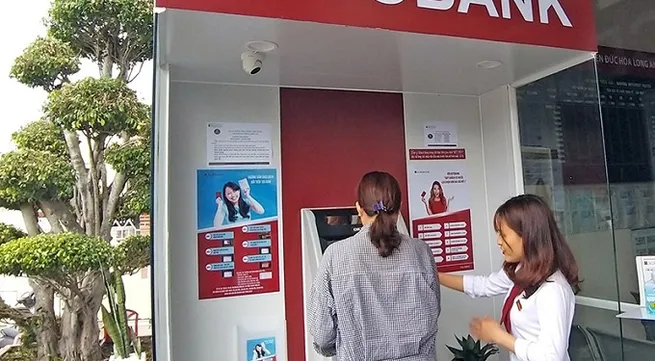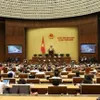Vietnam works to promote non-cash payment

Through activities in response to the event, people nationwide will have the opportunity to experience and clearly understand the benefits brought about by electronic payment methods, especially in the context of Vietnam as well as the world confronting the COVID-19 pandemic.
New payment technologies
According to the latest data from the SBV, Vietnam currently has 88.5 million bank accounts. The SBV’s payment system alone processes US$17 billion worth of transactions per day. In the first four months of 2020, payments via cards, the internet and mobile phones grew strongly relative to the same period in 2019, with domestic payments increasing by 26.2% in terms of transactions and 15.7% in terms of value via bank cards, surging by 3.2% and 45.7% via the internet, and expanding by 198.8% and 21.9%, respectively via mobile phones. The trend of payment methodology in the economy has shifted towards the use of non-cash methods, with payment methods for public services continuing to be expanded and widely implemented.
In addition, a recent VISA survey reported that Vietnamese consumers have reduced their use of cash due to an increase in digital payments through new payment technologies, such as contactless payments, mobile payments and e-commerce. According to the survey, 74% of consumers in Vietnam expected to enhance non-cash payments in the next 12 months. For the group of those carrying less cash, the main reason was the fact that more and more places now accept non-cash payments. At the same time, many people who have never made contactless payments voiced their interest in this method. Even some new forms, such as biometric payments (fingerprint and voice authentication) and digital banking, also drew the attention of more than 80% of the surveyed consumers.
However, it remains a big question whether non-cash payment methods will continue to be maintained and can replace the traditional form after the COVID-19 pandemic. General Director of the National Payment Corporation of Vietnam (NAPAS) Nguyen Quang Hung said he is not optimistic about COVID-19 being a boost to the market, but stated that during the recent period of social distancing, many people had the chance to try new payment methods. When the disease abates, they will see this as an alternative for cash, thus gradually changing their consumption habits and practices and increasing the use of non-cash payments in Vietnam.
Improving legal corridors
The recent changes in payment behavior have not only sparked a non-cash payment race between commercial banks but also between businesses and technology companies. According to a representative of the Ho Chi Minh City Union of Trading Cooperative (Saigon Co.op), the company is targeting a non-cash payment rate of 30% at Co.opmart and Co.opXtra supermarkets as well as at Co.op Food and Co.op Smile stores over the next four or five years. Over recent years, Saigon Co.op has promoted communication on the benefits of non-cash shopping to consumers at more than 800 points of sale, through offering discounts and presenting gifts to users making purchases via cards, QR code scans or electronic wallets. In response to the Non-cash Day 2020”, this June, Saigon Co.op will continue to cooperate with banks, intermediary payment organisations and e-wallets to launch many preferential programmes for customers at their Co.opmart, Co.opXtra and Co.op Food outlets across the country.
“However, the efforts of enterprises are only effective when the State and functional agencies apply stronger solutions to promote non-cash payments. In particular, it is necessary to have a master development plan for POS and payment acceptance systems, as well as re-planning the providers of non-cash payment services,” Marketing Director of Saigon Co.op Do Quoc Huy said.
According to Director of the SBV’s Payment Department Pham Tien Dung, the legal framework for payment activities is continuing to be reviewed and supplemented, and creating more favourable conditions for non-cash payment development, including the SBV’s Decision No. 711/QD-NHNN dated April 15, 2020 issuing an action plan for the implementation of the Prime Minister’s Directive No. 01/CT-TTg dated January 14, 2020 on promoting the development of Vietnamese digital enterprises.
In addition, the SBV has delivered timely instructions concerning the exemption and reduction of payment service fees for customers, aiming to support residents and businesses affected by COVID-19, such as the prompt promulgation of Circular No. 04/2020/TT-NHNN dated March 31, 2020 amending and supplementing Circular No. 26/2013/TT-NHNN on reducing 50% of inter-bank payment transaction fees via the inter-bank e-payment system, effective from April 1 to December 31, 2020. At the same time, the SBV has issued a written request asking banks to lower money transfer fees through the system. Also, the SBV has twice directed Napas, commercial banks and foreign bank branches to exempt and reduce payment service fees. It is estimated that the total amount of payment service fees exempted and reduced by banks for customers until the end of 2020 will be more than VND1 trillion (US$42.96 million).
Promoting e-payments towards a cashless society is an inevitable development trend in the context of the Industrial Revolurion 4.0, creating a dual impact including accelerating economic growth and supporting the implementation of the comprehensive financial strategy through the universalisation of banking-financial services. SBV Deputy Governor Nguyen Thi Hong said that in the near future, the SBV will continue to build and supplement legal corridors for e-payment activities, thus meeting all requirements for new business models, products and services on the information technology platform, with a focus on digital banking and digital payments. In addition, the SBV will research and implement payment methods in rural, remote and isolated areas associated with the implementation of the national comprehensive financial strategy, as well as facilitating e-payments in Government and public service areas.
Up to now, about 50 banks have completed the connection of electronic tax payments with tax and customs agencies in 63 cities and provinces nationwide, with 95% of customs revenues implemented via banks and 99% of businesses registering to pay taxes online. Some 27 banks and 10 organisations have provided intermediary payment services for electricity bill collection, with nearly 90% of the Electricity of Vietnam (EVN)’s revenue from power sales collected through banks. In addition, 30 hospitals have been connected to deploy electronic fee payments, with some having 35% of their fee payment transactions conducted via non-cash methods.





